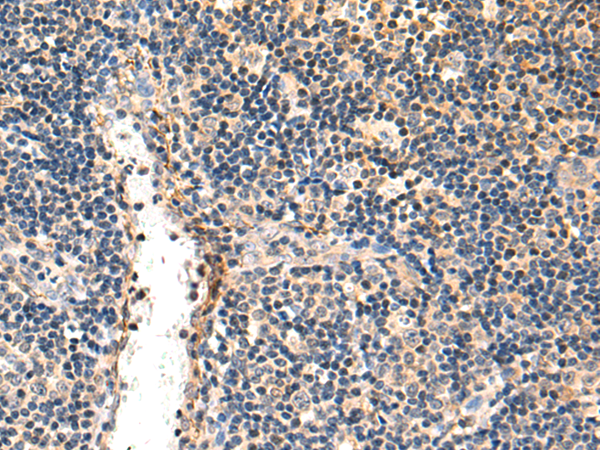
| WB | 咨询技术 | Human,Mouse,Rat |
| IF | 咨询技术 | Human,Mouse,Rat |
| IHC | 1/50-1/100 | Human,Mouse,Rat |
| ICC | 技术咨询 | Human,Mouse,Rat |
| FCM | 咨询技术 | Human,Mouse,Rat |
| Elisa | 1/5000-1/10000 | Human,Mouse,Rat |
| Host/Isotype | Rabbit IgG |
| Antibody Type | Primary antibody |
| Storage | Store at 4°C short term. Aliquot and store at -20°C long term. Avoid freeze/thaw cycles. |
| Species Reactivity | Human |
| Immunogen | Fusion protein of human MLN |
| Formulation | Purified antibody in PBS with 0.05% sodium azide and 50% glycerol. |
+ +
以下是关于MLN(膜性狼疮性肾炎)相关抗体的3篇文献概览:
1. **文献名称**:抗磷脂抗体在狼疮性肾炎中的临床意义
**作者**:Smith A, et al.
**摘要**:研究探讨抗磷脂抗体(aPL)与膜性狼疮性肾炎(MLN)的关联,发现aPL阳性患者肾病进展风险显著升高,提示其可作为MLN预后评估的生物标志物。
2. **文献名称**:抗C1q抗体在狼疮性肾炎亚型中的表达差异
**作者**:Zhang L, et al.
**摘要**:通过分析不同狼疮性肾炎亚型患者的血清,发现抗C1q抗体在MLN患者中特异性高表达,可能参与肾小球基底膜免疫复合物沉积的病理过程。
3. **文献名称**:抗PLA2R抗体在继发性膜性肾病中的诊断价值
**作者**:Johnson R, et al.
**摘要**:研究发现,尽管抗PLA2R抗体主要见于原发性膜性肾病,但在部分MLN患者中也可检测到低水平表达,提示需结合临床与其他抗体进行鉴别诊断。
注:MLN在不同研究中可能指代不同概念(如膜性狼疮性肾炎或分子生物学中的特定靶点),以上文献基于肾脏病学领域筛选。若需其他方向的MLN抗体研究,建议补充具体背景信息以便精准推荐。
MLN antibodies, often associated with research in oncology and autoimmune diseases, are a class of immunoglobulins targeting specific molecular markers or pathways linked to pathological conditions. The term "MLN" may refer to molecular targets such as proteins, receptors, or antigens involved in cellular processes like proliferation, apoptosis, or immune regulation. For instance, in cancer biology, MLN antibodies might focus on tumor-associated antigens (e.g., MLN may denote membrane-linked neoantigens) or checkpoint proteins (e.g., PD-1/PD-L1) to enhance immune-mediated tumor clearance. In autoimmune contexts, they could target self-antigens implicated in diseases like lupus or rheumatoid arthritis.
The development of MLN antibodies often leverages hybridoma or recombinant DNA technologies to ensure specificity and affinity. Their therapeutic potential lies in precision targeting, minimizing off-site effects compared to traditional therapies. Clinically, MLN antibodies may serve diagnostic roles (e.g., detecting biomarkers in tissue samples) or therapeutic ones (e.g., monoclonal antibody drugs). Research continues to optimize their efficacy, reduce immunogenicity, and explore combinations with other treatments. Challenges include tumor resistance mechanisms and high production costs. Overall, MLN antibodies represent a pivotal advancement in personalized medicine, bridging molecular insights and clinical applications.
(Word count: 199)
×